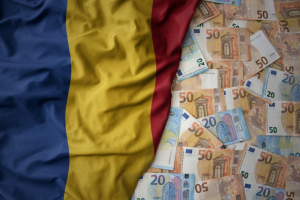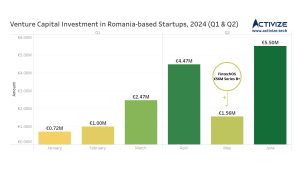Introduction
Ending the year, it’s time to think about what happened in the world of Romanian venture capital investments during 2022.
This article is based on our scouting and mapping processes, through which we gather various news, updates, events, opportunities and many other topics of interest related to the startup ecosystem. Part of the Startup Ecosystem Radar, we prepare this information in a digestible form and deliver it to our subscribers on a weekly/bi-weekly basis, with the aim to inform them about the ecosystem and help them make business decisions. If you would like to get these reports, subscribe by using the form at the end of this article.
This is a yearly article, you can check out the 2021 edition here and also we have made a wrap-up in which we discuss the first half of 2022 from startup investments perspective.
Funding for Romania-based startups
While the amount raised in the first part of 2022 seemed to announce a really good year in terms of investments attracted by the Romania-based startups, the second half of this year has made a downturn in the slope.

Based on the public announcements, in the first half of the year we have tracked 35 rounds of investments worth ~€50.5M (we treat DRUID’s $16M series A round as an outlier, the data on the graphics below doesn’t include this round), while in the second part of the year we monitored 32 rounds with a total of ~€28.77M.
This way, the total amount invested in 2022 reaches ~€79.27M in 67 deals without the series A round of DRUID. We note that there were also 2 other rounds that were not disclosed (Innoship, Froopt).
In comparison with 2022, in 2021 the investment scene looked the following way:

We can observe that while in 2021 the last two quarters were the most successful, this year the page has turned and we can say that most profitable investment quarters for the Romanian ecosystem were the first two ones, having the highest investment volume.
Since last year, the funding environment for startups has been shifting, with ups and downs, the global situation (Russian war against Ukraine, crisis and inflation, technology stocks going down, etc.) has caused a general decrease in the total amount invested by venture capitals in 2022.

In view of the last 5 years, we identify a continuous growth with 2021 being more than double the previous year, but 2022 breaks the trend. Based on our data, venture investing fell by 7.35% compared to 2021 for the first time in the last few years. Due to the current situations worldwide, we expect that this downward trajectory will continue also for the near future.

Considering the deal size, we have the following:
- €916.2K in 9 rounds up to €200K (probably more rounds below €200K are closed, but are not announced publicly)
- €15.71M in 33 rounds €200K to €1M
- €30.07M in 18 rounds €1M to €3M
- €32.57M in 7 rounds higher than €3M
Some of the highest and most important deals from the second half of 2022 were the following:
- Romanian startup AMSIMCEL, a GPU-Powered physical verification framework with high-performance computing capabilities attracts €4.8M blended financing through the European Innovation Council Accelerator (link).
- The Romanian startup Sessions announced the successful completion of a financing worth $4.5M. The round was led by Earlybird Venture Capital, with participation from Stride.VC and Launchub Ventures (link).
- The Romanian startup Nestor obtained an investment of $2M, in a round led by Eleven Ventures, with the participation of Underline Ventures, to help companies excel operationally through an HR strategy based on employee skills (link).
- Yarooms, a SaaS company providing leading workplace experience solutions, has secured €2M financing to pursue a new market opportunity and accelerate growth. GapMinder was lead investor with €1.6M and the round was supported also by SeedBlink (link).
- Goodlegal received a pre-seed investment of €1.2M from Earlybird Digital East Fund, which led the round, Credo Ventures together with Daniel Dines, and including the latest CEE VC fund, Underline Ventures (link).
Funding for foreign startups with Romanian founders
Regarding the funding raised by startups which have at least one Romanian co-founder, this totals ~$521.96M in 13 deals and 2 undisclosed ones, almost double compared to 2021 when the sum was ~$289.27M in 9 deals.
The biggest investments were the following:
- Branch, a USA-based startup founded by Romanian Madalina Seghete and which helps companies drive seamless mobile experiences through its linking infrastructure, has received a series F investment worth $300M led by New Enterprise Associates (link).
- The German startup Avi Medical, co-founded by the Romanian Vlad Lata, received an investment of €50M Series B for the development of its digital family medicine platform. The round was led by Balderton Capital and joined by Vorwerk Ventures, Heal Capital and others (link).
- OutThink, a London-based human risk management startup, founded by Romanian Flavius Pleșu, raised a $10M seed round led by AlbionVC. Gapminder, TriplePoint Capital, Forward Partners and Innovate UK also have contributed (link).
Some conclusions and trends on pre-seed and seed stages
- Less rounds below €200K are made compared to the previous years, which means that the value of initial private rounds have grown and the need of the capital is much higher.
- It happens that startups don’t announce the small rounds publicly. Also, some of the grants programs existing are covering the need for initial capital, but far from covering the whole demand.
- The convertible notes type of deal at pre-seed is common by now and, in some cases, the raise spans during 6-10 months (with some investors joining the convertible notes in the same deal as the first ones, but with a bit less risk as the startup advanced during those months).
- The angel investors networks are well organized, with clear processes and very active in the pre-seed and seed rounds. Communication among Romanian angel networks is good and co-investments are the norm.
In the following lines, we’ve gathered opinions from Romanian investors, which depict the perspectives on the ecosystem. We thank them for the contribution.
1. Cristian Negrutiu (Sparking Capital): “Regarding the year 2022, I think the key word was caution, especially after the start of the war and rising inflation. It’s not about fear or panic, it’s just that things are moving harder. I think the trend will continue in the first part of 2023.”
2. Bogdan Iordache (Underline Ventures): “2022 was a year of changing the rules of the investment game, a year that made the transition from the exuberance of 2021 to the uncertainty of 2023.”
3. Alina Georgescu (Catalyst Romania): “2022 was challenging, but also empowering for those who were more adaptable and who used resources in a more efficient way.”
4. Cristian Dascalu (Gapminder): “From GapMinder’s perspective, this year’s investment ecosystem was characterized by a continuous swing between caution in evaluating startup growth plans and openness to founders who address well-validated problems and proven traction in the market. In the case of Techcelerator, we noticed an additional openness on the part of several co-investors and actors from the regional ecosystem towards active collaborations on a longer horizon.”
5. Daniela Aldescu (Smart Impact Capital): “In 2022, although we are coming after a period of challenges, we have noticed an effervescence in the market, there are still many opportunities, many undiscovered talents. Investors looked and are still looking carefully at the ecosystem, it is perhaps one of the best moments for the ecosystem in Romania and in Europe, we see that the businesses have started to deliver consistently, to understand the expectations. I firmly believe that there is a huge potential in the area of sustainability, of products and services that respond to the new reality, and we saw this in 2022 as well – there are start-ups that have proven and have the potential to bring added value to the country.”
6. Stevanca Vieru (Growceanu): “As the year progressed, investors were much more careful with their investments, having the clear expectation that valuations would be adjusted downwards (expectation set by the change in the economic environment: increasing uncertainty, increasing inflation, increasing interest rates, very large discounts on the stock market). The founders had difficulty assimilating this need of the investors, for them the pressure was in the opposite direction: the increase in costs and the increase in uncertainty, therefore a greater need for money. Only 15 of the 45 startups that were invited to pitch in 2022 received an investment from Growceanu members. The significant increase in the volume invested by Growceanu members (almost 1.3M vs 500k) comes against the background of the more than 4-fold increase in the number of members compared to 2021.”
7. Valentin Filip (Fortech Investments): “The year 2022 was one of expectation. Many investors postponed investment decisions. At the same time, on the advice of investors, the startups tried to raise much larger rounds to ensure a longer runway, but in the end, due to the paralysis in the market, they end up exhausting their current resources. However, we are happy that we have reasons to trust the startups in which we decided to invest and we will continue to support them in 2023 from a more solid position.”
8. Tudor Ciuleanu (RebelDot Ventures): “This year, we’ve been presented with many more opportunities than in the past years. The main channels for opportunities were direct contact, Transylvania Angels Network, Growceanu, and Seedblink. The average quality of the opportunities has risen significantly compared to last year.”
9. Ilinca Paun (Bravva Angels): “I cannot issue very general conclusions, I am looking at my investment thesis, tech enabled by female founders. I saw it this way:
- Many startups in the green/circular economy area. Many, already well thought out, with traction and a feasible business model. They attract a lot of attention from investors, but they hardly receive financing – they usually turn to free grants.
- It is very difficult to obtain funds in the second round (Seed) in Ro, we have an extremely small number of VCs and they moved very hard, being some at the end of the fund. If the investor did not invest in the first round, it is more difficult to enter later, he prefers to keep money for his portfolio.
- Decent ratings, opening founders to lower the rating, in early (pre-seed) rounds.
- Inflow of funds from outside (Poland, Bulgaria) with interest for Romania, in fact with CEE strategy. It’s a novelty.
- The total absence of European VCs, we are not on their radar at all. The feedback of the majority of the founders after visits abroad is “they said let’s grow and come back”.
- We have no relations at the level of the venture capital sector between us (very little collaboration and only if it’s on a hill) and almost none with Europe. The only one that does this and opens collaborations is Seedblink, and the acquisition and expansion in Western Europe helps us a lot in creating a reputation.”
Meanwhile, stay tuned for various news and updates with our newsletters:
- Startups League – with opportunities of funding, competitions, grants, conferences and other benefits for startups,
- Startup Ecosystem Radar – with relevant news from the Romanian startup ecosystem and
- Investors League – for angel investors and venture capital funds, providing valuable info about startups fundraising.
Article written by Andrea Erdo and Mircea Vadan.





